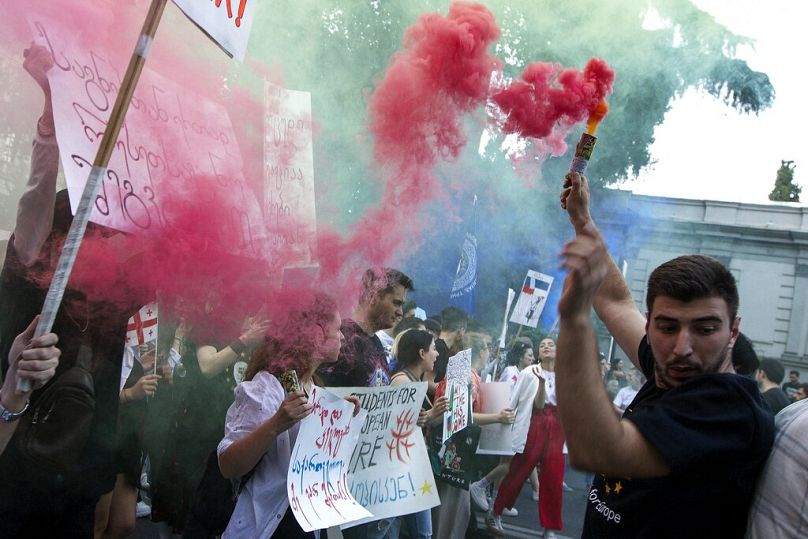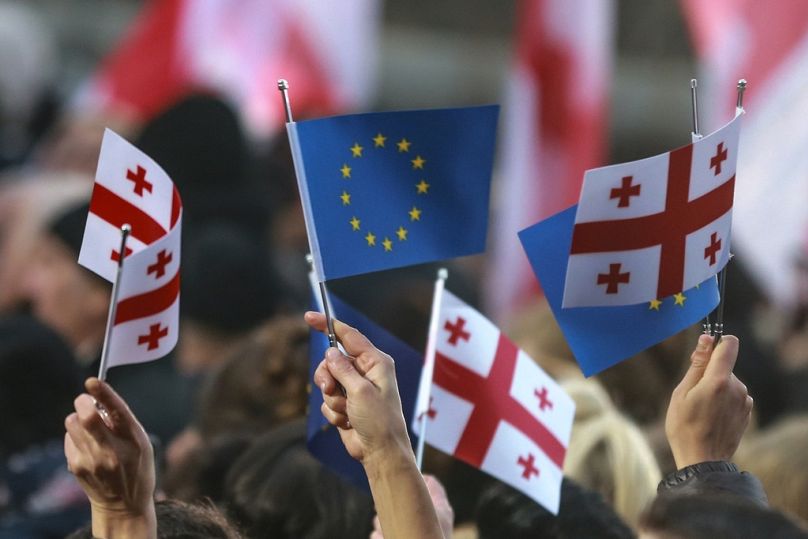Georgians defeated the law last year and emerged stronger and more committed to the fight. Now, they brace themselves for a repeat, if not an even more daunting struggle, Elene Panchulidze writes.
As fighting becomes more challenging in Ukraine, domestic politics keep intensifying across the wider Eastern region. Again, Russia is suspected of causing turmoil in Georgia.
Yet another struggle is unfolding in Georgia as the ruling party moves to clamp down against civil society and women's rights. Reintroducing the already once-defeated "foreign agents" bill has brought Georgia back to an acute crisis, with severe implications for European security.
On Monday, the Georgian government reintroduced the controversial foreign agents law into parliament. Public revolt outside evoked a sense of déjà vu as the government dropped the same bill due to popular demand exactly a year ago.
On the 35th anniversary of the anti-Soviet, democratic demonstrations, Georgians now march in a symbolic rally of freedom to defend the assault on democracy posed by the Kremlin-inspired repressive law. This year's rally calls "Yes — to Europe, no — to Russian law".
Shockingly, this new crisis is the result of the ruling Georgian Dream party seeking Russian ties for an assault on democracy.
In the run-up to elections later this year, no sound government would seek a repeat battle over the foreign agents law, given its resounding defeat by the popular demand just a year ago.
With almost 40% of Georgians thinking the country is headed in the wrong direction, the government should be busy winning hearts and minds among the electorate, instead of gratuitously triggering civic unrest with Russian-style laws — especially given overwhelming popular support for the country’s EU membership, that this law puts at risk.
The country's EU bid is in peril
Last year, Georgian society rose up against the government's attempt to close democratic space. This was widely celebrated as a victory — a turnaround against the repressive crackdown on civil society and independent media.
Yet, the Georgian Dream has bided its time and returned to the offensive. Its ambiguous stance on Russia’s war in Ukraine and disinformation regarding the rationale behind it — claiming its lack of full support to Ukraine is to prevent dragging Georgia into a war — has lost traction.
While Georgia's regional peers, Ukraine and Moldova, advance on the path to EU membership and are soon to open negotiations, the pro-European public in Georgia fears being left out of the EU project due to its government’s truculence.
Russia’s invasion of Ukraine has opened the prospect of EU membership for Georgia, despite member states being sceptical of Georgia fitting into the union geopolitically. But, the Georgian public’s outcry and push for democratic values resonated in EU capitals.
Civic unrest against the Russian-style law harnessed a narrative of Georgia’s belonging to the European family.
Yet again, the government is threatening the country's EU bid with its authoritarian move — incompatible with priorities outlined by the EU for Georgia to progress towards EU membership.
Despite warnings from Brussels and public resistance in Tbilisi, the ruling party promises to proceed with the adoption of the bill. At this critical juncture, the EU needs to strike a delicate balance between driving back Russian influence and insisting on democratic reform in Georgia.
Having been deceived by the Georgian authorities before, Brussels needs to push for strong conditionality and back the public's overwhelming popular demand for a long-desired democratic future.
The Kremlin's fingerprints are seen all over
Georgians believe that "round 2" of the foreign agents law is merely the Kremlin's plan to divide the public.
A polarised society recently found unity around Georgia's historic win to qualify for the Euro 2024 football competition.
Many believe that the strength of unity widely celebrated across Georgia and a place at the European championship have caused unease in Moscow, humiliated in its latest attempts to destabilise and divide the country.
Georgians defeated the law last year and emerged stronger and more committed to the fight. Following the March 2023 demonstrations, more people considered Georgia to be a democracy.
Although many variables may contribute to this change, the success of civic protests in overcoming government crackdowns can count as a factor in increasing Georgians’ belief in their ability to exercise democratic oversight over the government.
One lesson from last year is that the contentious law rejuvenated the societal fabric in Georgia. The spectrum of civic activism extended from formal NGOs to civic movements, individual activists and the general public.
With an efficient division of labour, more formal NGOs have pushed hard to keep the country close to the EU, while informal groups and activists have excelled in reaching out to the broader society outside the political bubble, especially Gen Z-ers, fearlessly holding the Georgian government’s authoritarian moves at bay.
An even more unsettling struggle is on the horizon
This time, Georgians brace themselves for a repeat, if not an even more daunting struggle.
The 9 April sacrifice for independence puts pressure on the younger generations. The regime is known for its use of tear gas and water cannons in response to dissent. Additionally, authorities have held 21-year-old Lazare Grigoriadis behind bars since last year's protests — a sign that civic activism comes with heavy consequences.
In previous rounds of the fight for democracy in Georgia, young people saw some of their peers lose their eyesight, yet they persisted in resisting the law and choosing Europe over Russia time and time again.
This is why, together with warnings to the government, the EU needs to find a way of pushing back more effectively.
This is a difficult task because the EU cannot push too hard for fear of losing Georgia to Russian influence. The EU needs to grasp that the dynamics in Georgia extend well beyond its domestic politics.
This is a struggle of geopolitics, with autocracy threatening to engulf a young democracy, and because developing a better democracy is how Georgia is most likely to free itself from the post-Soviet yoke.
Elene Panchulidze is Research Coordinator at the European Partnership for Democracy and the European Democracy Hub initiative.
At Euronews, we believe all views matter. Contact us at view@euronews.com to send pitches or submissions and be part of the conversation.


